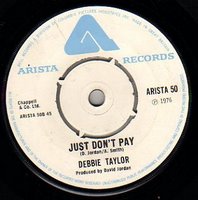
The records show that in January 1976 the US release of this single spent just 1 week in the Billboard charts at #100.
To my mind that’s a travesty, and 100 weeks at #1 would have been more justified for what is a brilliant double sider.
In one of his “Blues & Soul” (UK magazine) articles later in 1976 the late Dave Godin said this of the record in describing it’s UK release: “Now this one I'd have sympathised with any reluctance to issue in this country. It won't do a thing, and anyone who DID urge Arista to issue it needs their heads examined! Utterly brilliant, marvellous and all the rest of it, but SO uncommercial for this country I'd be happily surprised if it sold more than a thousand copies. One of the year's best released though.”
Did it reach a 1000 copies in the UK ? Don’t know. I seem to remember I picked it up in a cheapie bin some months after it’s release. I certainly bought it ‘blind’, but was maybe influenced by Dave Godin’s comments. Anyway I consider myself lucky to have it, even though as you will hear it’s, shall we say, a bit used. By all accounts the US release had longer run times on both sides. Whether the extra minutes intensified or diluted the experience I know not, but my UK copy is good enough for me.
 By the time of this single’s release (late 1975 in the US) the disco beat was already more than a distant sound emanating somewhere on the horizon and the sun was setting on the golden age of soul. Continuing the analogy with that great ball in the sky the sun’s intensity maybe highest at it’s zenith but it’s at it’s most beautiful and serene at sunset. Debbie Taylor’s “I Don’t Wanna Leave You” is a beautiful and serene soul record. Flip it over and “Just Don’t Pay” has a similar feel but a lolloping disco flavoured beat is also present (albeit understated and not much more than a slow canter). It’s possible to imagine that as “I Don’t Wanna Leave You” fades we are experiencing the final rays of a magnificent sunset, and, as the needle passes over the run-out groove, the shimmering orb dips below the horizon and the sun finally sets on the golden age of soul. If that’s the case “Just Don’t Pay” is maybe the red sky at night. Red sky at night bodes well, but as far as soul music is concerned I’m still waiting for a brighter future.
By the time of this single’s release (late 1975 in the US) the disco beat was already more than a distant sound emanating somewhere on the horizon and the sun was setting on the golden age of soul. Continuing the analogy with that great ball in the sky the sun’s intensity maybe highest at it’s zenith but it’s at it’s most beautiful and serene at sunset. Debbie Taylor’s “I Don’t Wanna Leave You” is a beautiful and serene soul record. Flip it over and “Just Don’t Pay” has a similar feel but a lolloping disco flavoured beat is also present (albeit understated and not much more than a slow canter). It’s possible to imagine that as “I Don’t Wanna Leave You” fades we are experiencing the final rays of a magnificent sunset, and, as the needle passes over the run-out groove, the shimmering orb dips below the horizon and the sun finally sets on the golden age of soul. If that’s the case “Just Don’t Pay” is maybe the red sky at night. Red sky at night bodes well, but as far as soul music is concerned I’m still waiting for a brighter future.Some trawling on the interweb (Soulful Detroit forums were valuable) has given me a bit more of an insight on Debbie Taylor’s career, but only a bit. She would appear to hail from Norfolk, Virginia and made her recording debut at Decca records in 1968 where she had two or three releases including “Check Yourself”. This track is included in a list of late sixties tracks that were apparently, in part at least, a result of collaborations between David Porter and Curtis Johnson & The Astors. Debbie then moved to the GWP label. In March 1969 “Never Going To Let Him Know/”Let’s Prove Them Wrong” was the label’s debut release and well worth seeking out. Debbie had another couple of single releases on GWP, The Hesitations were co-credited on one release and were almost certainly present on her other singles too. Production was by George Kerr. Her only album “Comin’ Down On You” was produced by Patrick Adams and released in 1972 on Today, and reissued on CD in 1997 as “Still Comin’ Down On You”. Apart from that the only other releases I can find reference to were lone outings on Grapevine (a GWP offshoot), Polydor and the Arista single featured here. A criminally small catalogue to leave, and I wonder where life took her after 1976?
Here are both sides, and I’ve included the sundown run-out groove!




























4 comments:
Wow, you are right. both songs are great in different ways. Sound quality is pretty good acually good job.
great wistful analogy of the death or dying of early 70s soul style and the birth pangs of discofication. (man that b side is GREAT)
thanks!
These are nice, yes. Good find.
never heard about her
thanks for these two tracks
NOOOOOOOOOOOOOOOOOOOOOOOOOOO
WHERE ARE THEY! NOOOOOOOOOOOO
Post a Comment